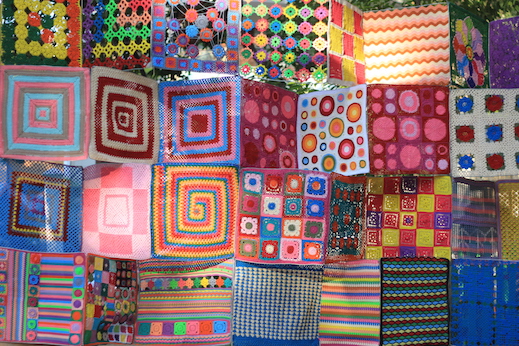
02 Apr In Indonesia, Knitting is a Disruptive Act

Bom Benang 2013 (Foto: Tanahindie)
Bright yarns and fabrics swathe the wrought-iron gates and gnarled mango in Kampung Buku (Book Village), the simple space in Makassar, Indonesia, where Fitriani Dalay lives and works with her husband and their young daughter.
Crocheted poppies on pencilled stems deck a canvas that rests on a ceramic sink; her six-year-old’s drawings adorn the gallery walls; and shelves lean under the weight of books on the history and culture of their part of Sulawesi, an island about the size of Missouri but geographically and culturally almost inconceivably more diverse.
“Art is not only for artists,” Fitriani says. And, whether it’s garlanding a Jakarta slum in phosphorescent knitted flowers for the Jakarta Biennale, Indonesia’s leading modern art event, yarn-bombing her street or placing her six-year-old’s work within the nexus of the gallery system, her work both builds community and disrupts convention.
Gentle and soft-spoken, with bright eyes and a calm presence, Fitriani knits as we speak. It’s an act that’s so unusual for tropical Indonesia, where weaving goes back thousands of years but knitting has no history, that it sparks a new engagement with a stranger almost every day. And that engagement was the genesis of her collective Quiqui, a response to the profound and often traumatic transition of new motherhood.
Fitriani’s original intention was to create a support group for post-partum mothers in this sprawling port and university city that’s grown by 20% or more in a decade. In rapidly urbanizing Indonesia, many still long for the strong, tight networks of the Indonesian kampung (think “village” as in “It takes a village”).
Or, as Fitriani puts it, “New mothers all over the world struggle with this transition in the cycle of life: it’s one of the great nadirs. From a woman, you transform into a mother. When a child is born, a mother is born alongside it.”
The group learned together to unravel the messy, disorienting web of new motherhood. “I didn’t know when to start my morning,” Fitriani says. “People would comment on my body, and laugh. It was impossible to leave the house as often as I could before because I had to take care of my baby. I felt helpless, almost useless. And then an opportunity arose.”
Knitting proved a lifeline, a thread that marked the trail through the perilous labyrinth of maternity. Today people come to Kampung Buku not only to use their reference library, see their exhibitions, or hold a book discussion, but to learn to knit.
In 2012, Quiqui created their first yarn-bombing event, with over 30 knitters, funded independently and through crowd-funding. “It was a protest against visual pollution,” says Fitriani. “Billboards, banners and pamphlets for elections were littering the city of Makassar at the time, and some of the billboards were nailed to living trees. Not only is it a visual violence, but it damages the trees.”
For long decades of dictatorship, Indonesia’s artists were at risk of censorship, imprisonment, torture or worse. And, while the nation is now a democracy, much power still resides with representatives of the old regime. Yarn-bombing was both political and personal, building communities while challenging old mores.
“We offered free classes,” Fitriani explains. “We had basic knitting, a flannel class, pocket book bindings, free printing, music and a craft market, as well as classes on women’s reproductive health and breast self-examination.”
Subsequent projects have also been political. Quiqui has campaigned for safe, convenient and free public spaces for women. By decorating public areas in lovingly handmade, carnival colors, they provide a counterpoint to rampant consumerism and throwaway culture in a fast-developing city.
From the perspective of the global north, both Fitriani’s concerns and her output seem intrinsically feminist. Yet she roots herself within the traditions of her Buginese people, the generally Muslim ethnic group to which many on this part of Sulawesi belong, in which the woman is the ruler of the home.
“I’m actually not a feminist,” she says. “I believe everything starts from human relationships that shouldn’t be concerned with gender, ethnicity, religion or any type of identity… By reusing materials, instead of consumption, I’m contributing to my child, my future children, my grandchildren – the heirs of the future.”
She is passionate about democratizing both the making and the consumption of art. “Good art is art that can touch and be useful for many people,” she says. “Today, the art world is not just about the artist and his work alone. But most people in Makassar believe that the art world is enclosed, that exhibitions should be exclusive, held in closed spaces with shiny floors and walls. We want to change this understanding.”
Both through Kampung Buku and through Quiqui, Fitriani navigates the space between public and private, work and home, personal and communal. In art as in life, it’s hard to tell where the boundary lies.
“Both me and my partner are learning by doing,” she says. “It’s not necessarily easy to separate public from private. But it’s training us into people who are open to criticism, more empowered, and more confident.” (Theodora Sutcliffe – @escapeartistes)

No Comments